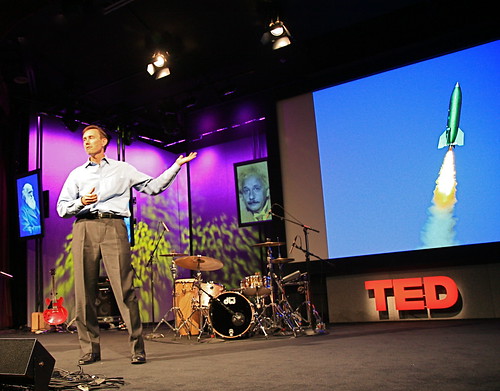
cc licensed flickr photo shared by jurvetson
The TED conference started as a forum for experts and innovators to give speeches and demonstrations about whatever it is that made them feel passionate. The ultimate goal is to foster communication and learning, so it's no surprise that many TED topics cover teaching and education. From authors to educators to billionaire philanthropists, everyone has something to say about the state of education--and how we can do better in the future--and millions of people have listened to these speeches in person or online, via the TED website.
Salman Khan: Let’s Use Video to Reinvent Education
Khan may not be a household name, yet, but he hopes that his ideas will become ubiquitous. Salman Khan created the Khan Academy, which uses a series of structured videos to teach curriculum. Originally, Khan Academy, focuses on mathematics, but it has since branched out to other subjects, including chemistry. In his speech, Khan encourages teachers to rethink the way they communicate with students. Rather than teaching courses at school and sending children home to do homework, Khan suggests teachers should use videos to teach subjects at home with videos and then bring the work into the classroom, where teachers can assist students. Khan highlights the benefits if interactive videos as a teaching method.
Sugata Mitra: The Child-driven Education
Mitra has a lot to say about teaching and the Internet, and he says it at TED. In 2010, he tackled the issue of a lack of teachers where they would do the most good. Mitra began an experiment in 1999 by placing a computer in a wall where children could access it. Sugata Mitra concluded, after studying the children, that they would quickly learn to use the computer and Internet, and further utilize the Web to teach themselves. Mitra argues that computers can replace teachers in these areas, allowing children who want to learn to do so.
Sir Ken Robinson: Bring on the Learning Revolution!
In his 2010 talk, Robinson introduces another type of climate crisis--one of human resources. Sir Ken Robinson argues that humans poorly use their talents, and this correlates to the way we educate in standardized schools, rather than tailoring learning opportunities for each student's individual strengths. A move to personalized teaching helps people better determine where their strengths lie, and how those people can use those natural talents to be both happier and more productive.
Mae Jemison: Teaching Arts and Sciences Together
In her 2002 TED appearance, Jemison makes the case for teaching arts and sciences together, rather than dividing the studies as schools currently do. Mae Jemison criticizes the stigma that logic and art cannot go hand in hand. In fact, she argues that the two are inextricably connected, and our schools should recognize and promote those connections through reintegration of science and arts. In her argument, Jemison explains how the science of today is based on the creativity of yesterday, and how we must continue to use both creativity and logic to create the foundation for tomorrow.
John Hunter: The World Peace Game
The final TED talk on this list was by John Hunter, the creator of the World Peace Game. In this game, Hunter used a wooden board to represent the interconnected crises of the world, and he encouraged fourth-grade students to propose solutions, which change the face of the game, to those issues. The game emphasizes global connectednes, encourages critical thinking and empathy, adds depth to problem solving and reveals natural talents, among other core principles. The World Peace Game teaches through interactivity, rather than lectures, and emphasizes real-world skills oft ignored by traditional education structure.

